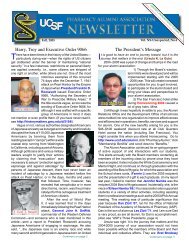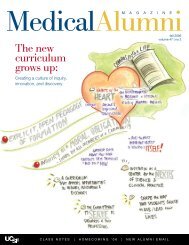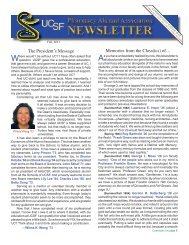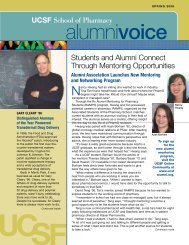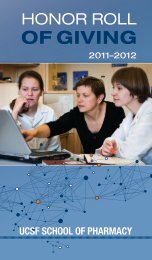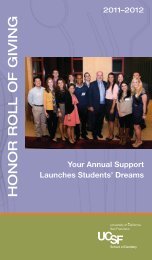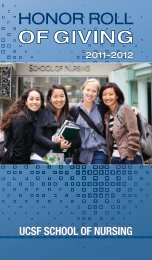here - UCSF Alumni
here - UCSF Alumni
here - UCSF Alumni
Create successful ePaper yourself
Turn your PDF publications into a flip-book with our unique Google optimized e-Paper software.
DianeWara, MDFirst associate dean for women’saffairs at any medical schoolDiane Wara counts her role as first associate dean for women’saffairs as one of her most important firsts. After graduatingfrom medical school at UC Irvine and completing her internshipat Harbor General Hospital in Torrance, Calif., she came to <strong>UCSF</strong>to finish her residency in the Department of Pediatrics. As one oftwo women residents, and the only one with a 3-week-old child,the department chair arranged an apartment on campus for herto use during nights on call.“T<strong>here</strong>’s a risk and a benefit to being early and first,” Wara,67, says. “The risk is no one’s been t<strong>here</strong> to grease your path.The benefit is people treat you specially.”For her next first, Wara became the first woman fellow inallergy-immunology at <strong>UCSF</strong>. In the early 1980s she was amongthe group who first identified HIV-positive babies. Then in theearly 1990s, Wara was one of those who introduced the idea thatif HIV-positive pregnant women were given one of severalanti-HIV drugs just before delivery, they would have a greaterchance of giving birth to babies who were HIV-negative. Thistreatment is now the international standard.Wara was named chief of the Division of Pediatric Immunologyand Rheumatology in 1985 – the first woman division chief inany medical department at <strong>UCSF</strong>. She was a member, along withDee Bainton, of the Chancellor’s Advisory Committee on theStatus of Women, and worked to change not only the maternityleave policy, but the availability of child care at <strong>UCSF</strong>. The newchild-care centers at Mission Bay and at 5th and Kirkham, aswell as the expanded facility at Laurel Heights, are direct resultsof her efforts.From 1991 to 1996 she held the position of associate dean forwomen’s affairs, adding minority affairs in 1996 until 2002. Of theappointment, she remarks, “No other institution had identifiedmoving women up the academic ladder and into leadership spotsin a fair manner, with fair pay, and a fair job description.”One might consider Wara an activist – a title she’s happy toaccept. She says, “I have a long history and interest and successin working with women’s issues. It takes a community to makechange, and I like doing it. I like helping turn <strong>UCSF</strong> into a betterplace to be. That’s what a good citizen does, right?”JulieGerberding, MD, MPHFirst woman director of the U.S.Centers for Disease ControlAs a 4-year-old, Julie Gerberding collectedbugs, building her first laboratory in the familybasement and laying the foundation for her careerin public health. As the director of the Centersfor Disease Control (CDC), she led the nation’sagency that fights epidemics and environmentalhealth threats, including bioterrorism, AIDS andinfluenza pandemics.After graduating with her medical degree fromCase Western Reserve University in 1981, Gerberdingcompleted her internship and internal medicineresidency at <strong>UCSF</strong>. It was the early years of the AIDScrisis, and Gerberding continued her training with afellowship in clinical pharmacology and infectiousdiseases. She went on her earn her master’s degreein public health from UC Berkeley in 1990.Gerberding joined the CDC in 1988 as directorof the Division of Healthcare Quality Promotion, apart of the National Center for Infectious Diseases(NCID). In 2001 she was appointed acting director ofthe NCID and almost immediately drew attention forher honest, calm and decisive handling of theanthrax attacks.In 2002 she was promoted to director of theCDC. Just six months later SARS hit, and again,Gerberding was the voice of reason for an alarmedAmerican public. Next, she handled a rare outbreakof monkeypox, a return of the West Nile virus,and a threat of avian flu. She initiated a “HealthyPeople at Every Stage of Life” campaign, whichintroduced programs for smoking cessation,screening for heart disease and stroke, and pushesfor increased physical education in elementaryschools. Gerberding stepped down from the postearlier this year.Today, in addition to being a wife and mother,Gerberding, 54, is an associate professor of medicineat Emory University in Atlanta and at <strong>UCSF</strong>.medical alumni magazine | 11



